Strikes in Greece
Traveling to Greece can be a rewarding experience, offering a beautiful amalgam of ancient history, stunning landscapes, and maritime charm. However, travelers planning their journey should also consider certain social dynamics, notably strikes, which can significantly impact travel plans. Like many countries, Greece has a history of strikes, which are often associated with economic grievances, labor rights, and political causes. Understanding the context and potential implications of strikes in Greece is crucial for anyone planning to visit this enchanting country.
Understanding the Context of Strikes in Greece
Strikes are a common occurrence in Greece, shaped by a long tradition of labor movements and societal activism. The Greek economic crisis that began in 2009 and the subsequent austerity measures have sparked significant public outrage, leading to frequent strikes across various sectors. These strikes can range from short-term, localized protests to nationwide general strikes that last for several days, impacting both local residents and tourists alike.
Strikes in Greece are often used as a means for workers to express dissatisfaction with government policies, particularly those related to austerity measures, wage cuts, and job security. The public sector, which includes transportation, healthcare, and education, is particularly prone to strikes due to government reforms aimed at reducing public spending. These strikes can occasionally be unpredictable and disrupt daily life, creating challenges for travelers who may find themselves caught in the middle of these social movements.
Impact on Transportation
Transportation strikes are perhaps the most impactful for travelers in Greece. Strikes can affect various modes of transport, including flights, ferries, trains, and local public transportation such as buses and metros. Greece's urban areas, particularly Athens, rely heavily on public transport, so a disruption in these services can cause considerable inconvenience for those exploring the city.
Ferry strikes are particularly important to consider, especially for travelers planning to visit the Greek islands. Ferries are a primary mode of transportation between the mainland and the islands, and a strike can lead to significant delays, cancellations, or changes in travel itineraries. Travelers are advised to stay informed about potential strikes and maintain flexibility in their plans, possibly preparing alternative arrangements or extending their stay on an island until ferry services resume.
Effect on Tourist Sites and Services
In addition to transportation, strikes can also affect access to tourist sites, museums, and landmarks. Employees at these sites, who may be part of public sector unions, sometimes participate in strikes as a form of protest against economic conditions or policy changes. As a result, popular attractions might be closed or operate with reduced hours, which can disappoint tourists eager to explore Greece’s rich cultural heritage.
Hotels, restaurants, and other hospitality services may also experience disruptions during strikes, particularly when staff join these collective actions. While many establishments strive to minimize inconvenience to guests, there can be delays in service or limited amenities available during such times. Therefore, it's beneficial for travelers to remain patient and understanding and to check with local contacts or hotel staff for updates on the situation.
Safety and Awareness
While strikes in Greece are generally peaceful, they can occasionally lead to protests or demonstrations, especially in major cities like Athens and Thessaloniki. These gatherings can be large and may disrupt pedestrian and vehicular traffic. Although tourists can remain safe by being aware of their surroundings, it's advisable to avoid the areas where demonstrations are taking place.
Travelers should keep informed about the local news and strike schedules, which are often available through various media outlets or tourism information centers. Embassies and consulates frequently issue travel advisories that provide valuable information about strike activities and any necessary precautions. Mobile phone alerts and social media can also be useful tools for staying updated on the latest news and developments.
Planning and Flexibility
Considering the potential for strikes, travelers are encouraged to plan carefully and remain flexible with their itineraries. Booking accommodation with flexible cancellation policies, purchasing travel insurance that covers unexpected disruptions, and maintaining open communication with transport providers can help navigate potential challenges. Travelers should also consider having backup plans, such as alternate routes or additional days built into their travel schedule, to accommodate any unforeseen changes.
Language barriers can sometimes pose a challenge, but many Greeks speak English, particularly in the tourism and hospitality sectors. However, having a few key phrases in Greek and relevant contact numbers readily available can be useful if caught in a strike-affected situation. Engaging with locals or expatriate communities can provide insights and practical advice on handling situations related to strikes.
The Resilience of Greek Hospitality
Despite the occasional disruptions caused by strikes, Greek hospitality remains warm and welcoming. Locals understand the importance of tourism to their economy and often go out of their way to ensure that visitors have a pleasant experience. They are generally willing to assist travelers in navigating strike-related interruptions and can provide recommendations for alternative activities or sites that remain accessible.
Moreover, engaging with locals during times of disruption can offer a unique perspective on Greek culture and societal issues, deepening a traveler’s understanding of the country beyond its stunning landscapes and historical sites. Sharing stories and experiences with locals can enrich one’s travel experience, turning potentially challenging situations into memorable interactions.
In sum, while strikes in Greece are a factor to consider when planning travel, they need not detract significantly from the experience. By maintaining awareness, leveraging local knowledge, and adopting a flexible approach, travelers can enjoy the many wonders Greece has to offer, even amidst social and economic movements. Such adaptability not only ensures a smoother journey but also offers a richer, more engaging travel experience through direct interaction with Greece’s contemporary societal dynamics.
Greece Ferries Halt Feb 28, 24 Hour Seafarers Strike

Greece Ferry Strike Halts Island Sailings Feb 28

Greece Taxi Strike, Athens Airport Transfers Jan 13-14
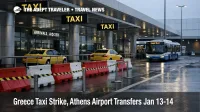
Athens Taxi Strike, Airport and Port Transfers Jan 13
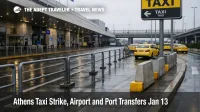
Greece Taxi Strike And Farmer Roadblocks Extend Disruption

Greece Taxi Strike And Roadblocks Disrupt Airport Access
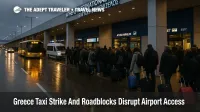
Greece Rail Strike Knocks Out Trains, Including Airport Link

Greece Rail Strike To Halt Trains November 18

Athens Taxis Back Early, Airport Links Normal by 6:00 a.m.

Athens Taxi Strike Now Live, Airport Links Thin Nov 5-6
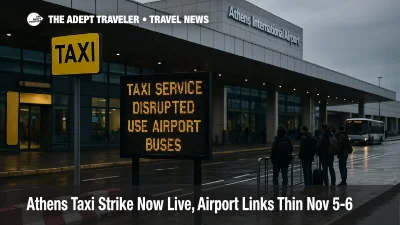
Athens, 48-Hour Taxi Strike Nov 5-6, Airport Links Strained
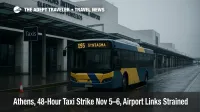
November Protest Watch: Budget Actions May Disrupt Travel

Athens protest alerts near metro stations this week
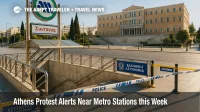
Athens strike aftermath: plan extra time for Athens airport transfer

Greece: Athens strike aftermath complicates transfers

Greece general strike squeezes Athens transit windows and airport access
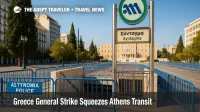
Greece general strike on Oct. 1: what's running and how to reach the airport

Greek Tourism Workers Strike: How It Could Impact Travelers

